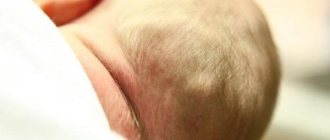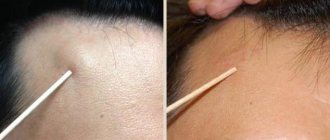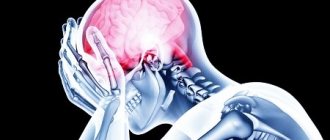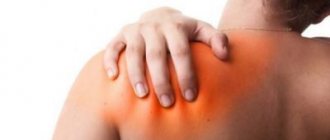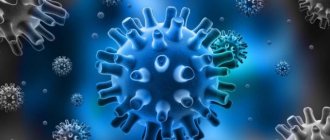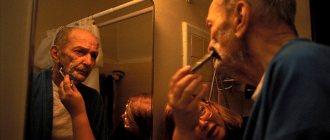A person often experiences headaches, the causes of which are unknown.
Almost all people try to take medicine to relieve discomfort.
It seems that I took a pill and that’s it, the pain subsided. But she suddenly returns after some time.
What to do if you have a headache after stress? Experts do not recommend taking pills indiscriminately, as they can only aggravate the situation and provoke dangerous complications.
Due to the fact that there are many factors that cause headaches, a person needs a thorough diagnosis.
The problem may be simple stress or a serious illness that cannot be ignored.
This suggests that it is better not to self-medicate, but to contact specialists in a timely manner to make a final diagnosis.
Why do you get headaches when you're stressed?
Even if a headache occurs after severe stress, this indicates the presence of some pathology in the body.
Doctors identify several main factors that provoke pain. It is worth considering them in more detail.
Tension headache
Most of all headaches are associated with tension after stress.
This pain can be acute or chronic. The acute course is characterized by rare but prolonged attacks, during which a person has a severe headache.
We can speak of a chronic course when the headache occurs 180 days a year and lasts 2 weeks a month.
Stress is accompanied by the following symptoms:
- Sleep problems: a person sleeps little or cannot fall asleep at all.
- Increased anxiety.
- Irritability.
- Change of mood.
- Apathy, depression.
It is worth considering that headaches are caused not only by brain tension, but also by muscle tension in the cervical vertebrae or eyes.
Similar problems arise against the background of constantly driving a vehicle, while spending a long time at a computer and while working with small mechanisms in a factory.
Tension headaches appear during treatment with antidepressants, analgesics and tranquilizers.
You need to be able to distinguish such manifestations from migraine, which is quite difficult to do, because the symptoms can often coincide.
Tension pain is characterized by the following symptoms:
- Feeling of unpleasant pressure in the head area.
- Bursting sensations.
- The pain radiates from the temples to the crown or back of the head.
- The head may hurt on one side or on both sides.
If the problem is not neglected, then doctors will quickly help the person get rid of discomfort.
Migraine
This is a problem in which a person experiences a one-sided headache after stress.
In addition to having a headache, a person is faced with severe photophobia, visual disturbances, loss of sensation in the limbs and a feeling of “pins and needles” throughout the body.
A migraine attack is characterized by nausea and vomiting. Pain in the head becomes dull or throbbing and varies in intensity.
Doctors are inclined to the following causes of migraine:
- Heredity.
- Vascular pathologies, when blood flow to the brain significantly worsens.
- Neurological disorders.
- Improper metabolism.
Only a qualified specialist can make an accurate diagnosis through a complete examination of the patient.
It is very important to exclude diseases that require urgent drug therapy.
There are several main symptoms that indicate the development of migraine:
- The person had at least five attacks of head pain.
- There is a throbbing headache after stress.
- The intensity of the pain is moderate or increased. It becomes more acute with physical activity.
- Nausea and vomiting appear.
Often, migraine is diagnosed when doctors have not found any connection with other pathologies.
High blood pressure - hypertension
It just so happens that with age, human blood vessels become less elastic.
People who have crossed the age of 40 often experience surges in blood pressure, which can either rise or fall.
If a patient has atherosclerosis, then during stress he often has a headache in the back of his head.
This situation indicates an increase in blood pressure, characterized by compression in the forehead, nausea or vomiting.
When there is a sharp rise in blood pressure, a person is diagnosed with a hypertensive crisis.
If the pressure is not kept under control, then there is a risk of developing a disorder in the cerebral circulation.
Muscle tension
Tension in the muscles of the cervical spine often leads to headaches in patients. Why is this happening?
A person should observe his symptoms a little: if his head hurts after reading a magazine or heavy physical labor, then one can suspect a pathology in the cervical spine, which is associated with an uncomfortable body position.
In order to eliminate such discomfort, you should lie down or sit more comfortably and ensure that your workplace is fully illuminated.
During the working day, you need to periodically rest, performing special neck exercises: turning and bending the neck.
What to do?
What should you do if you have a headache from nerves? In this case, medications will help.
They help relieve pain quickly and effectively. The ideal option would be the following drugs: Analgin, Finlepsin, Pentalgin.
For people who are hot-tempered or suspicious, who are prone to nervous agitation, the doctor recommends taking medications with a predominance of inhibition - Relanium.
If it is necessary to eliminate pain that has arisen due to a depressive state, then it is necessary to take antidepressants.
Only a doctor can prescribe them, and they are sold in pharmacies with a prescription. It is necessary to strictly follow its recommendations and take medications only as prescribed.
There is a connection between headache and spasm. For example, with a sharp spasm of blood vessels, pain occurs and, conversely, due to pain, a spasm appears.
How pain manifests itself after stress
Stress headaches are divided into two types: episodic and chronic.
The episodic type is classified as “mild”, observed after a stressful situation and lasts about 7 days.
With chronic pain, severe discomfort occurs every day, causing depression and irritation. This pain is most often associated with injury.
Tension headaches are manifested by squeezing and pulling sensations in the temples.
It seems to a person that a hoop has been placed on his head. Many patients experience tense muscles in the neck, face, shoulders, or chewing muscles.
Very often, problematic breathing is added to these symptoms.
People have difficulty breathing indoors, they often yawn, do not tolerate light and noise well, and suffer from loss of appetite.
The differences between heart pain and nerve pain and stress from real illnesses
Pain syndrome due to neurosis or stress does not have a clear connection with physical activity and has a paroxysmal course. Cardialgia is very diverse: aching, pulsating, cutting, does not have a constant localization, is accompanied by headache, lack of air, sweating, motor agitation, long-lasting, can radiate under the shoulder blade or left arm, but there is no irradiation to the lower jaw.
With typical pain during an angina attack, patients, as a rule, are inhibited, describe the pain briefly, point to the site of occurrence with a clenched fist, the attack occurs after walking or overwork. Characteristics of true heart pain in coronary artery disease:
Localization of pain during angina pectoris
- localized behind the sternum;
- pressing, squeezing;
- radiates to the left shoulder blade, forearm, left half of the lower jaw;
- increases with movement, relieves with nitroglycerin;
- the attack lasts from 5 to 30 minutes.
The main criteria for diagnosing the psychogenic occurrence of the syndrome are diverse and prolonged pain that exceeds objective signs on the ECG, does not have a constant connection with a traumatic factor, and provides the patient with psychological or social benefits.
How to treat headache pain due to stress
If a person has just begun to treat stress and pain associated with it, then he will be prescribed relaxation, hypnosis sessions and auto-training.
Patients should be explained the etiology of the pathology and talk about the factors that provoke it.
Although doctors recommend forgetting bad habits, leading a healthy lifestyle and eating right, not all patients listen to their advice.
It is much easier for a person to take a painkiller than to change the usual pattern of life.
If we talk about drug therapy, doctors prescribe non-hormonal drugs that relieve inflammation, antidepressants and drugs that eliminate hypertonicity in the muscles.
Do not forget that it is forbidden to try to cope with the problem on your own, as this can lead to serious complications for the body.
Doctors rarely resort to using medications. To get rid of discomfort you need to do the following:
- Massage your neck and back.
- Place cold on the problematic and painful area.
- Relax more often.
- Swim in herbal and salt baths.
- Adhere to a therapeutic diet based on proper nutrition.
In addition, experts strongly recommend performing physical therapy, which relaxes the muscles well.
Preventive measures
When treating this symptom, the following rules must be followed:
- Improve family relationships. You should try to keep your home as calm as possible. Home is a place for relaxation, not for showdowns and constant scandals.
- It is important to spend your vacation away from home. It is recommended to completely change the location. It is desirable that it be the sea or mountains.
- Exercise. You can eliminate the stress that you have accumulated during the day only through intense physical activity.
Under constant stress, the body releases a large amount of adrenaline, which tones the blood vessels.
Because of this, wear and tear of blood vessels and various diseases of the cardiovascular system occur.
When playing sports, the body releases a huge amount of hormones, wastes them and then begins to work normally.
- Find a hobby. You need to find something that will allow you to take your mind off your usual routine.
- Work occupies an important place in the life of every person. But if this leads to disruption of the body’s functioning, then it needs to be changed.
How to deal with headaches at home
If a person is tormented by stress and headache, then he can drink black or green tea with added sugar or lemon. You can also use mint tea.
Viburnum or potato juice, consumed 4 times a day, helps to cope with migraines.
An infusion of lemon balm is appropriate when the patient experiences severe stress.
To prepare it, you need to prepare 30 grams of lemon balm, poured with 2 cups of boiling water.
The resulting infusion should be wrapped in a warm scarf and placed in a dark place for 30 minutes.
After this, filter the product and drink 3 spoons 5 times a day. Valerian tincture is prepared as follows: take a tablespoon of the root and pour a glass of boiling water.
The resulting product is covered and left alone for 12 hours. Then they drink 2 times a day, 25 milliliters at a time.
If migraines or muscle tension occur too often, people should massage their heads.
It is better to do this in a ventilated room where oxygen does not stagnate.
Treatment
Therapy for cephalalgia due to stress should be comprehensive. The list of medications and other measures is selected by the doctor based on the characteristics of the case, the general condition of the patient, and the causes of the problem. It is strictly forbidden to try to relieve discomfort by taking painkillers in response to discomfort. This can provoke the development of abuse syndrome, which is very difficult to get rid of.
Medication options for treating stress headaches include:
- analgesics - “Pentalgin”, “Analgin” - act directly on nerve endings, relieving pain;
- antispasmodics – “No-Shpa”, “Spazmalgon” – eliminate vascular spasm, expand their lumen, normalize blood flow and eliminate manifestations of hypoxia;
- antidepressants - Finlepsin, Amitriptin - fight depression and other manifestations of stress;
- sedatives – drugs of natural and chemical origin that relax the nervous system.
The duration of drug therapy is determined by the doctor and can range from 2 weeks to 2-3 months. You should not stop taking prescribed medications when the first signs of improvement appear. If treatment is not completed, the problem will soon return. To enhance the effect of the activities, changes should be made to the usual rhythm of life.
Avoiding caffeine and alcohol, getting plenty of rest and moderate exercise will speed up recovery. Additionally, it is worth considering alternative therapy options.
Folk remedies for the treatment of tension headaches:
- pine relaxation – add 2 tablespoons of pine extract and half a glass of sea salt to a bath of warm water. The duration of the procedure is 10 minutes. It is recommended to carry out the manipulation daily for a week before bedtime;
- lemon balm tincture - steam a teaspoon of the herb collection with a glass of boiling water and leave in a thermos or covered for an hour. Strain the mixture and take 2 tablespoons up to 6 times a day until the liquid runs out.
All steps taken should be previously agreed with your doctor. The listed approaches are perfectly combined with each other, but if the treatment is abused, there is a risk of creating excessive stress on the body.
How to avoid headaches
There are several basic rules that a person under stress should adhere to. They are:
- Sleep more so that your body can fully rest.
- Walk more often and lead an active lifestyle.
- Spend more time outside, saturating the body with oxygen.
- Don't overexert yourself emotionally.
- Avoid alcoholic beverages.
If you follow all these recommendations, stress will quickly subside, and pain in the head will no longer bother you for a long time.
How does the disease develop?
Stress is the number one cause of headaches. Very often pain occurs as a response to strong emotions.
For example, this could be a conflict situation at home or at work, as well as unexpected strong joy or fear.
Nerve pain in most cases occurs in people who have diseases of the cardiovascular system.
Such pain can also be caused by infections or injuries to certain areas of the brain.
Frequent emotional stress can cause intense pain in the head.
